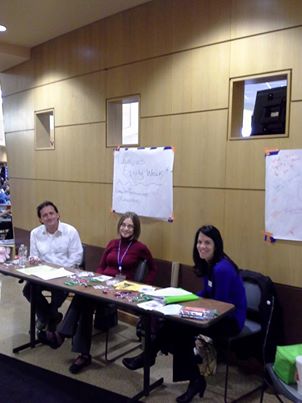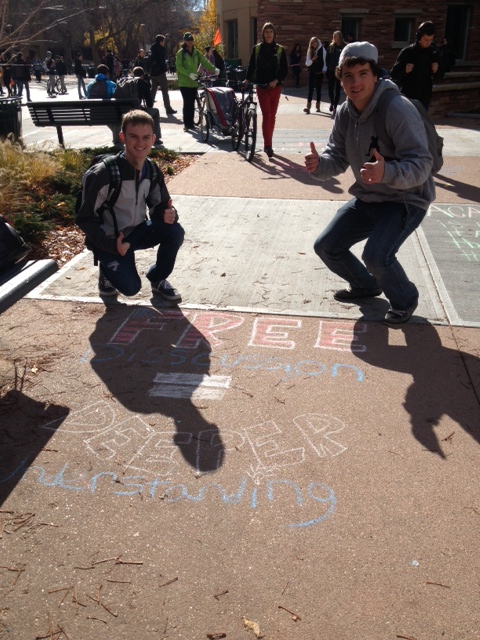| March 11, 2015
Front Range Community College adjunct professor Caprice Lawless grades papers as she waits for her turn at the Sister Carmen Community Center food bank in Lafayette, Colo., on March 5, 2015. Lawless has two masters degrees and almost 16 years of community college teaching experience. She says has to choose between incurring debt or visiting a food bank each month to survive on her approximately $20,000 a year adjunct instructor salary.
She has two masters degrees and almost 16 years of community college teaching experience. Yet she said she has to choose between incurring debt or visiting a food bank each month to survive on her approximately $20,000 a year adjunct instructor salary.
“It’s a spiritual challenge,” Lawless said.
In the State of the Union address earlier this year, President Barack Obama identified two years of free community college education as a means to help the middle class. It’s not only the students who could use a leg up.
Adjunct professors scraping by on assistance from family, charities, and safety net programs like Medicaid and food stamps continue to push for fair compensation and work conditions. Higher education institutions across Colorado employ part-time faculty, but adjuncts in community colleges say their situation is particularly dire.
Adjuncts currently represent 4,060 employees, or 78 percent of instructors at the 13 colleges in the Colorado Community College System, and are paid per class, largely without benefits, sick leave or job security.
Across the country, adjuncts staged a “National Adjunct Walkout Day” on February 25 to protest wages and working conditions. Organizers held events on Colorado campuses, too, including around 70 people who gathered in the middle of the Auraria campus in Denver.
“These are qualified teachers and I think we should be doing better by them,” said state Sen. John Kefalas, D-Fort Collins, who has championed legislation that would end the disparity between pay for adjuncts and their full-time faculty counterparts. “Ultimately that impacts the quality of the education.”
The community college system contends that its funding ranks below all other higher education institutions in the state and that it needs the workforce flexibility of employing part-time instructors. Creating more full-time positions would be cost-prohibitive for students and unresponsive to the state’s economic needs, said Colorado Community College System President Nancy McCallin.
“The two primary sources of funding – tuition as well as state funding – really restrict us from a financial standpoint from being able to operate in any other model,” McCallin said.
Adjuncts and full-time faculty are paid at significantly different rates. For “part-time” and “full-time” instructors teaching identical standard credit loads of 30 hours per week, the system estimated it would spend $20,828 on average this year in salaries for adjuncts and $53,693 on average for full-time instructors, who also receive benefits, according to budget documents.
Starting in July, adjuncts will be eligible for health insurance if they work 30 hours a week or more, according to the Community College System.
The community colleges assert only one-third of adjuncts want a full-time teaching job. At current staffing levels that would represent 1,270 employees. Adjuncts trying to piece together a career and their allies in the legislature say the result of this “two-tiered system” of payment pushes highly educated and accomplished education professionals to the edge of financial disaster.
Adjuncts Teeter on the Edge
Adjunct professor Nathanial Bork says he and his wife are “good at being poor.”
To save money, the couple has had to forgo a plumber for their broken kitchen sink, not to mention the expensive genetic testing to diagnose their daughter’s developmental disability.

“It’s frustrating; It’s humiliating,” Bork said. “You keep telling yourself, ‘If I get full-time, it’ll all work out.’”
Hand-written thank you letters are among the trophies Bork displays at home. They are from students who found direction, their voice and a compassionate ear in his class.
“He was the first professor who treated me as a person,” said Christina Mazingo, who flunked out of her first try at college. Mazingo now supports herself as a nanny as she works towards nursing school.
Gene Gonzalez is a former Marine who says he suffers from post-traumatic stress disorder and a traumatic brain injury. “There are times I am so fatigued while I come to his class,” Gonzalez said. “But once his lecture starts, I feed on his motivation and energy.”
Bork has paid a personal cost to help them. Last year he made $25,292 working full-time hours at two part-time jobs at the Community College of Aurora and Arapahoe Community College, while serving as adjunct representative to the faculty senate and running special projects.
This semester Bork teaches four classes, a number which could increase, decrease, or altogether disappear without notice next semester. He is paid around $2,000 per class but each class requires 2 1/2 hours outside class to prep lessons, grade and respond to student questions. He estimates it levels out to about $13 an hour.
Without a work office, he grades from home.
Over 90 percent of adjuncts surveyed by the Colorado Community College System last year said pay was their No. 1 concern, but nearly 70 percent said they were satisfied with their jobs. Bork himself attests to the joy of teaching and improving students’ lives.
In different survey by the American Association of University Professors, 77 percent of Colorado adjuncts responded that pay and benefits were inadequate for their needs.
“There are definitely points when we were down to our last $100 and didn’t know where money would come from,” Bork said.
With no savings, Bork and his wife teeter one step away from “catastrophe,” he said. He is considering a career change.

The Debate Over Hiking Pay
“I’d love to pay our adjunct instructors more,” McCallin said. “Given where we have our funding at the state level, we are not funded in a manner that would allow that.”
The system has made a “concerted effort” and a “significant commitment” to increase adjunct pay, she said, including a increase in the pay rate per credit hour over the past five years.
In the past two years, two bills have failed in the state legislature that would have changed adjunct pay and working conditions. House Bill 14-1154 and Senate Bill 15-094 would have granted equal status to part-time instructors and full-time instructors, and was estimated to cost between $55.4 million and $97 million.
The community college system lobbied against the bills, because they would lead to the state’s “micromanagement” in community college business, McCallin said.
Senator Kefalas is not giving up. The community colleges could dedicate money currently in their reserve funds to begin to increase adjunct pay next year, he said.
“There should be a way for them to put some skin in the game to do this initial increase, and that would give us more ability to go to the Joint Budget Committee of the legislature and ask for money,” Kefalas said.
A task force convened by the Community College System devised a series of recommendations to improve adjuncts’ work conditions, including raising their pay 28 percent which was estimated to cost roughly $20 million.
In February, the State Board for Community Colleges and Occupational Education, which oversees the system, agreed to implement almost every other recommendation, such as providing more opportunities for adjuncts to participate in college decision-making and compensating adjuncts 10 percent of their expected pay when a class is cancelled on short notice.
However, the board did not approve the recommendation of increasing adjunct pay, citing the difficult “current political environment.”
Right now the community college system is requesting $43 million from the legislature’s capital development committee to fund construction projects.
English adjunct Lawless is a leader in the local chapter of the American Association of University Professors, which pushes for recognition of adjuncts.
“Stop building all those buildings,” Lawless said, on her way home from the food bank. She wants to see greater investment in instruction. “Let’s put the foundations under the schools where the foundations belong, which is in the teaching.”



